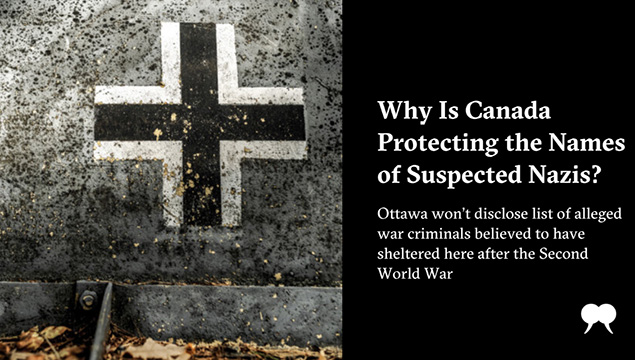
Ottawa advised against releasing names of alleged Nazi war criminals over concerns for Ukraine.
Federal government departments advised against releasing the names of 900 alleged Nazi war criminals, fearing that it could fuel Russian propaganda and hurt Ukraine, while posing a threat to the security of surviving SS veterans who settled in Canada after the Second World War, ‘The Globe and Mail’ reports.
Earlier this month, Library and Archives Canada (LAC) declined to release a secret report containing the names of alleged Nazi war criminals who settled here after the Second World War in response to Access to Information requests by The Globe and Mail and Jewish organization B’nai Brith.
The decision to keep secret Part 2 of the 1986 Deschênes Commission’s report has been criticized by Jewish groups and historians worldwide. The government has faced calls for decades to release it.
Several government departments, including Justice and Global Affairs, had input into whether to release it under access law. Among the concerns that were raised was the danger of the report being abused by Russia’s propaganda machine to undermine Ukraine.
Hundreds of members of the Ukrainian SS Galicia Division who settled in Canada after the Second World War are among the names in the unpublished 1986 report.
Richard Provencher, a spokesman for LAC, said the decision to withhold the report “was based on concerns regarding risk of harm to international relations.”
He said authority to disclose the report rested with Pascale St-Onge, Minister of Canadian Heritage, who has oversight of LAC. She can delegate her authority under the Access to Information Act.
Charles Thibault-Béland, a spokesman for Ms. St-Onge said that the Heritage Department had relied “on the advice of public-security officials who have expertise in these matters, taking into account the geopolitical context at this time.”
But David Matas, legal adviser to B’nai Brith, said “by coming to Canada, the members of the Galician SS Division were able to find immunity for their criminality because the Deschênes Commission did not use the Nuremberg Tribunal definition of war criminals, but rather a Canadian-specific limited definition.“
He added that “the notion that releasing the names of the members of the division would somehow assist the Russians in their invasion of Ukraine is perverse.”
Bernie Farber, founding chair of the Canadian Anti-Hate Network said “we deserve to have a complete and factual history of these Nazi enablers who lived amongst us.”
read more in our Telegram-channel https://t.me/The_International_Affairs

 8:56 16.11.2024 •
8:56 16.11.2024 •






















